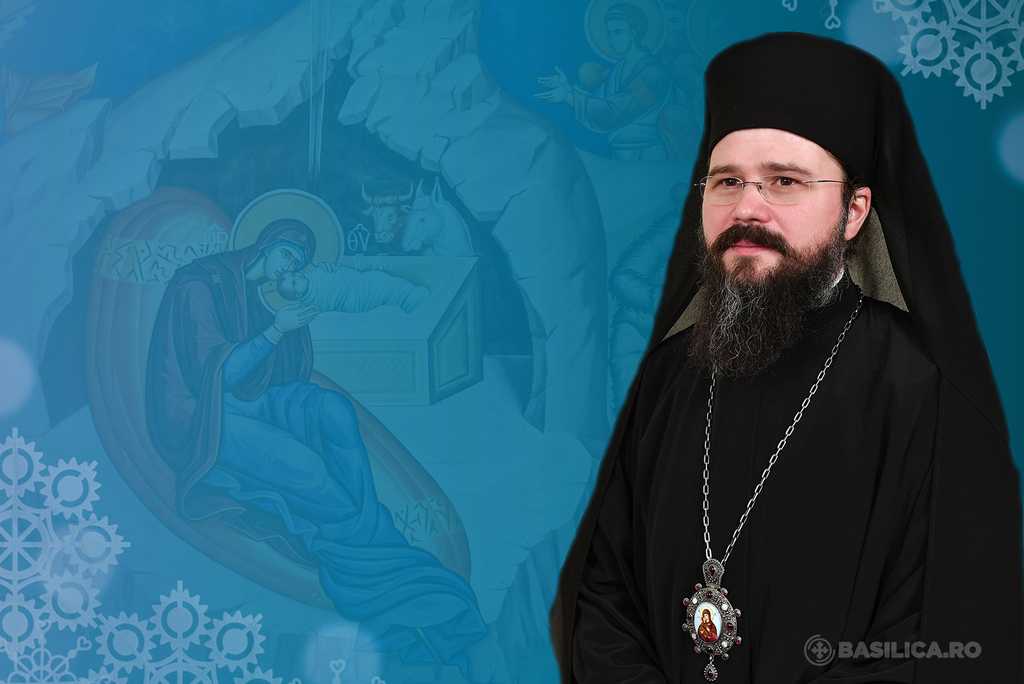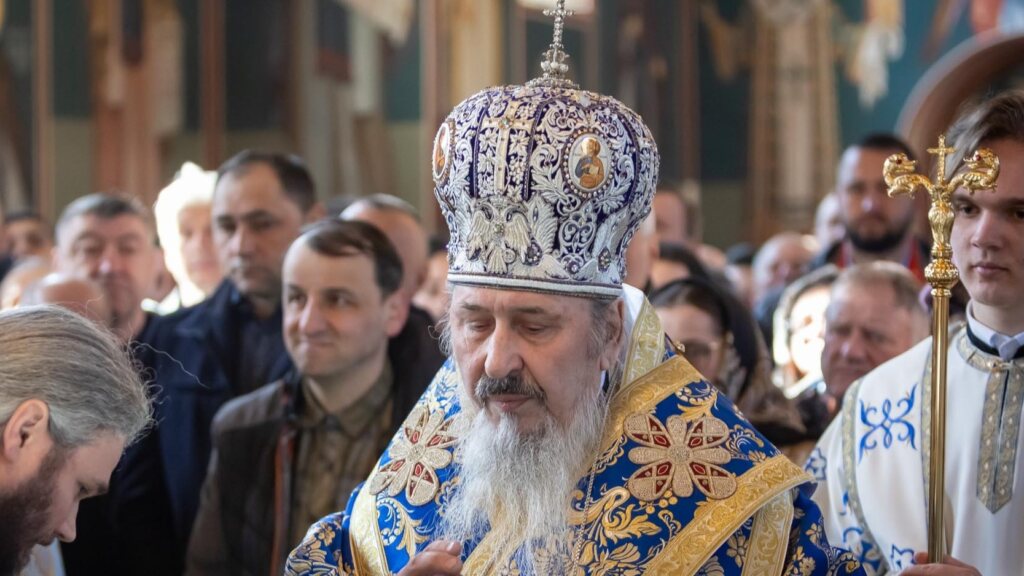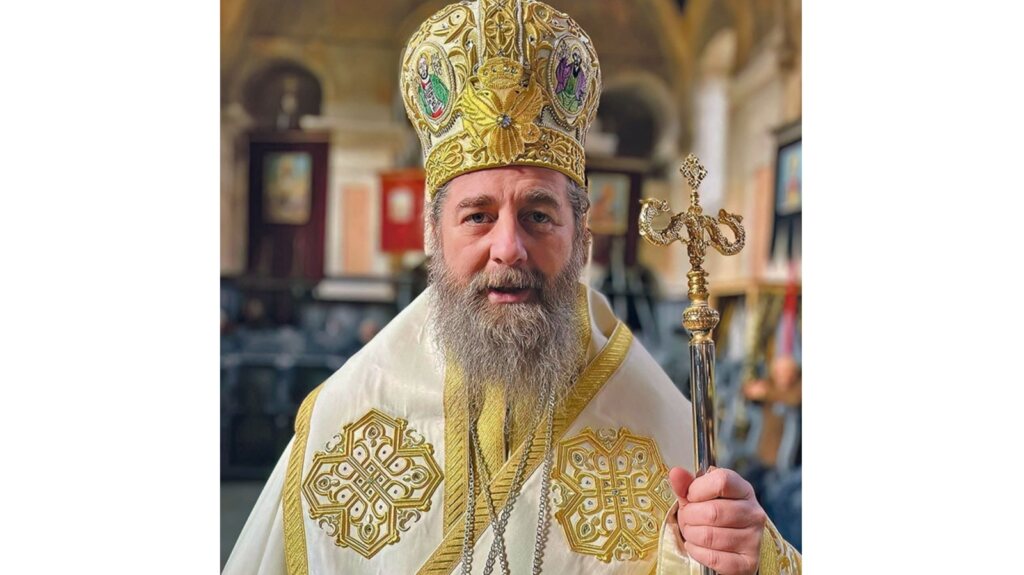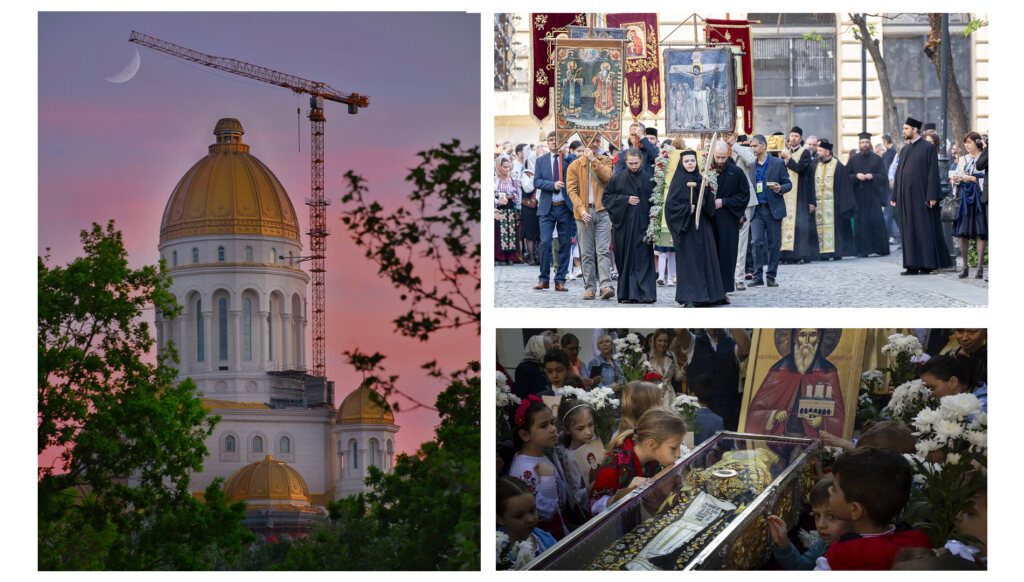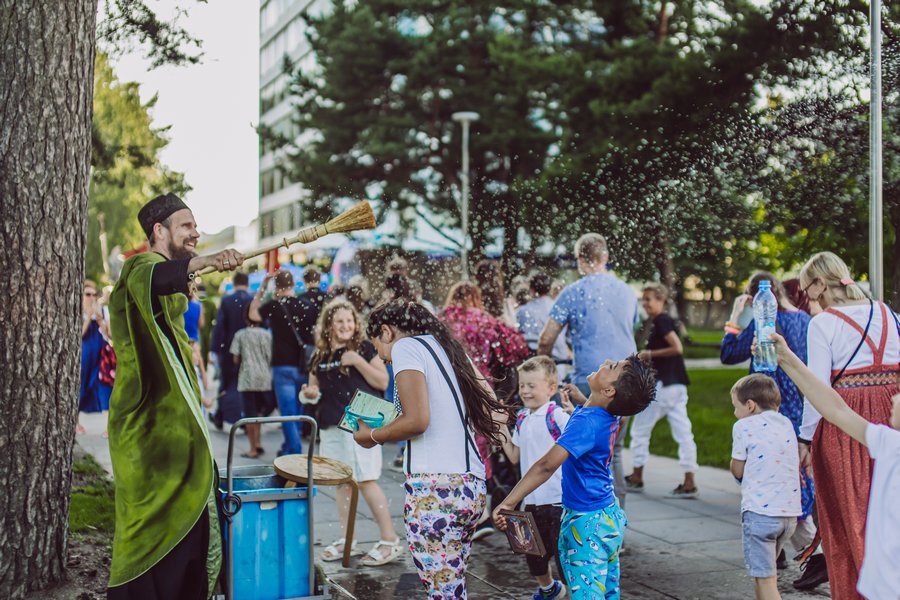By God’s grace Bishop of the Orthodox Romanians living in Northern Europe, to the most reverend clergy, the venerable monastics and the beloved faithful: Greetings with a holy embrace in Christ Emmanuel, Who was born in the manger of Bethlehem and in the manger of our hearts!
My beloved spiritual sons and daughters,
Our Lord’s Nativity is a Feast of hope, fulfillment, tenderness and sacrifice. A Feast of hope, for God is visiting His people, not through an angel, not through a prophet, but through His Only-Begotten Son. A Feast of fulfillment, for at long last, the promised One, the awaited One, the prophesized One, Messiah, has come down among us, He is with us.
Emmanuel: God is with us! A Feast of tenderness, for through His birth, God has taken flesh, assuming the „form of a servant”, the Almighty being a baby, the most frail and vulnerable creature on earth. A Feast of sacrifice, for our Saviour took upon Himself the form of a servant and came as a baby in order to sacrifice Himself for our sake. His sacrifice begins at the very moment of His birth. He is born in a humble manger, and immediately afterwards His Virgin Mother and the Righteous Joseph have to go into exile. And this was only the beginning.
Perhaps we are less used to think about our Lord’s Nativity in terms of an act of sacrifice, as we do at Easter.
In one of his sermons, Metropolitan Anthony of Suroj says the following: „The first step in bringing the world into being was an act of divine love which presupposed a sacrifice: the Father brought His Son to the altar of sacrifice, the Lamb slain from the foundation of the world (Revelation 13:8). There is an old Greek icon which portrays Christ’s Nativity: we see the Mother of God, we see Joseph, we see the cave, but instead of the manger, we see an altar of sacrifice and on this altar of sacrifice is laid the New-Born Son of God, the Son of Mary.”
For this reason He, the King of kings was born in a humble manger. In a place made for sheltering the animals of some common people. In a place lacking any social position, any exterior symbol of power, in a stable for sheep, outside of Bethlehem, in the same way in which He was crucified outside the walls of Jerusalem.
But here too, there is a mystery, because only in this modest stable people from all social strata are able to come and worship Him. Wise man and simple shepherds reach Him. Had He been born in a palace, then a great distance would have occurred between Him and the people. Had He been born in an ordinary house, then the usual barriers which set aside the space for the family and friends would have taken effect.
Thus, that humble manger tears down all social distances, those invisible borderlines between people, the pre-existing and often unjust hierarchies, in order to initiate new relationships of love and brotherhood between the people, new evangelical hierarchies, in which the last is first, and the one who rules is the servant of all.
For this reason Christ was born today. He was born to be brought as a well-pleasing sacrifice for our salvation. He was born so that we may have life and may have it abundantly. He was born so that we may have again a homeland, and may return back home, to the Heavenly Jerusalem. He was born so that we may have once again an image, an identity, a meaning.
He was born in order to bear us of water and Spirit. He was born to be our King, Lord, Brother, Servant, most-humble Servant washing our feet and wiping away our tears. He was born down here, in the midst’s of suffering and need, so that we may not remain alone and forsaken, as He was on the Cross.
Today Christ is born, my beloved! He is born for you, who are a mother cradling your baby; for you, who are approaching the zenith of life; for you, who work like a slave to make a living; for you who left your country because you couldn’t find your purpose; for you, young man, who gaze with worry toward the future; for you, who are overcome by the daily grind; for you, mother whose children were forcibly taken away.
For us all, Christ is born! Even we are not born for our own sake. We are born for the other. We are born to one another, from the very beginning, when we are born to a father and a mother. We are born as a sacrifice, but the central question on which our salvation rests is: to whom will we be brought, or bring ourselves as a sacrifice? Unto Baal or unto God? Will we be sacrificed to egoism, to our own ego, or will we sacrifice ourselves for the sake of the other? Will we be a sacrifice unto Mammon, or unto the Heavenly King?
My most-beloved,
Our Church has dedicated the year approaching its end to the memory of the defenders of Orthodoxy during the Communist era, that is to the martyrs and confessors of the Communist persecution. Not so long ago and not too far from us, great atrocities have happened, terrible things about which it is painful even to read or hear, let alone to experience.
Tens and hundreds of thousands of people, innocent of all guilt except for the love of Christ and the love of country, were arrested, cruelly torn away from their families, tortured to death, crammed into underground rooms, imprisoned in veritable laboratories of hell, subjected to a regime of extermination and dehumanization through starvation, violence, systematic defilement.
Hell for those inside the prison, hell for those outside… Hell, because of the torments they suffered themselves, hell because of the torments suffered by their companions, hell at the thought of the suffering of those left behind at home. In this hell, however, a light overcame the darkness.
Christ was born in prison! Christ was born at Aiud, at Gherla, at Pitești, in the terrible room 4 Hospital. He was born at Periprava, at White Gate, Târgu Ocna, Târgşor, Mislea and Miercurea Ciuc. Christ was born at Jilava, Văcărești and Râmnicu Sărat, at Sighet and in the workers shacks at the Danube-Black Sea Canal.
Christ was born in labour camps and in prisons, for the deported and the exiled! Yes, there, in those rotten dungeons, in the midst of pestilential scents, inside those concentration camps that had become inhuman, there Christ was born! We see it in the transfigured suffering of the martyrs and confessors of faith, we see it in the bloodstained poems of the imprisoned poets, in the lives of saints in prison engraved in our hearts.
From the countless accounts of martyrdom and models of holiness in prison, I would like to evoke a marvelous birth into the Kingdom of Heaven which happened at Târgu Ocna, a prison where TB prisoners were brought in, on Christmas Day of year 1951. On that Christmas Day, Father Archimandrite Gherasim Iscu, an ascetic of the Tismana Monastery, was dying after having been tortured at the Canal because he would confess and spiritually encourage his brothers of suffering.
Even so, in his last moments at Târgu Ocna, Father Gherasim continued to confess, encourage, and spiritually revive the other inmates. Those who were near him in those moments testify that they were bathed in Divine Grace. Here is what one of them wrote: „In that miserable mix of prison and tuberculosis there was a clear, vibrant pulsation of the soul, such that everything seemed other-worldly, wonderful.” We are told that Father Gherasim, as he approached death, was more and more alive!
The greatest miracle was that, a short time before his death, a common-law prisoner was brought to Târgu Ocna; this prisoner had served as a construction supervisor at the Canal and had viciously inflicted pain on Father Gerasim. Hearing this, although he was unable to move, the Father asked his inmates to take him to his torturer’s bed. With the greatest love, the Father embraced him, kissed him, wiped away the tears of repentance and shame of the one who had tormented him, confessed him, and gave him forgiveness. On that Christmas night, they died together, victim and torturer, born new creatures in the Kingdom of Heaven.
So here’s why we honour the Saints in the prisons. Since that whole system had been created in order to dehumanize, to worsen off the prisoners, to turn them into murderers of their brothers, traitors and torturers, in order to disfigure the image of God in man, people like Father Gherasim Iscu, through sacrificial love, overcame this hell not only for themselves, not only for their co-suffering brother, but they were able to snatch from the claws of that hell even their tormentors, those who had become tools of the devil.
All these people, therefore, have defended the image of God engraved not only in themselves, but also in us. They kept alive the candle of faith in God, and also the faith in what we represent as a people. Because of them we have retained the human image and can call ourselves Christians and Romanians. Because of them, we have a homeland here on earth, and a homeland in Heaven. All these confessors of faith believed in a common good and did not want to live only for themselves but wanted to live and die for their fellow men, for their faith, for their homeland, for the dignity of their children and their descendants.
Let us wholeheartedly honor those in whose midst Christ was born. Let us honor those in whom Christ has been greatly glorified. Those who were honored by Christ. Let us honor them even if many of them are not found in the history books, and even when our honouring is regarded with hostility by others. Let us honor them because they do not need our honor: rather we need it, if we want to call ourselves Christians and Romanians.
Beloved brothers and sisters in prayer,
We, the Romanians in the diaspora, are physically far from our country. We remember with nostalgia the Christmas season of our own childhood, the unforgettable and unique scents of our homeland, the carols, the New Year’s traditions and the frosty days around the Epiphany. We remember a living, warm, soul-filled world. We can not forget it, we miss it and we painfully long after it the more here, in this cold, alien and in many ways dead world.
Far from our country we gather together in order to rediscover ourselves in the Eucharistic communion, inside improvised places of worship and all kinds of buildings that have not been built for this purpose. We do not have great cathedrals, we do not have large, spacious churches equipped with resounding bells.
However, in these foreign places, at these Romanian altars raised in improvised and humble locations, let us remember Christ, Who was born in the manger. Though living at the edge of the society, a society often hostile to faith, let us remember the First of the outcasts and the First of the exiles, Christ born in a manger seeking refuge in Egypt from Herod’s rage.
It is very tragic that most of you have left the country because you felt that you had no future there. A future for your families, for your children. Even so, far away, we know that we have a country, that we come from somewhere, that we have certain roots. It is a terrible thing to be abandoned, and the truth is that many of the Romanians in the diaspora have perhaps felt that their country abandoned them.
But those who have sacrificed themselves in prisons are a living proof, crying out to Heaven. They have not abandoned us and have not abandoned their country. Let us listen to their testimony, let us take heed, let us stand in fear!
Let us also not abandon our country! Let us not abandon our own people! Let us remember that we have not been born by our own selves, nor have we been born only to us, but rather that we belong to a family, that we belong to a community, that we have ancestors and that we have descendants, that we are in a continuity of sacrifices, of struggles and of ascetic endeavours.
My dear sons and daughters in spirit,
During our Lord’s Nativity season we read in the Gospels a long list of ancestors of Jesus. In this long line there are righteous people of God, but there are also fallen people. Christ did not break up with His own race, but assumed it whole, with righteous people and sinners. He was born in a real community, with concrete ancestors, each one carrying his own name.
Let us therefore understand that we also are born into a concrete nation that we must assume. Today we are told through various channels that our nation is a shame, and our heroes were dishonourable people and criminals. History is rewritten, and our most valuable examples are slandered and marginalized. In the face of this nihilist wave, let us take up our nation’s cross and carry it with dignity, ignoring the reproaches thrown upon our forefathers and people, fixing „our eyes on Jesus” (Hebrews 12: 2).
In the end, I would like to bring to the gate of your soul „The Carol of the Servant” composed by Valeriu Gafencu in honor and in memory of Father Confessor Gherasim Iscu:
On the banks of Trotuș
Sing the servants of the Lord,
Yoked to His yoke.
But their singing is mute,
Since it is born from suffering,
And with tears braided.
In the heart of the servant
The Lord makes his manger
On Christmas night.
Lillies rain down from the heavens
Over His new manger
And dew drops out of the flowers.
There’s a baby in sight
And he looks with wonder
At the window of the prison.
Next to the little baby
An angel stopped
Whispering in a lovable tone:
Today Christmas has moved
From palace to jail
Where the Lord is locked up;
And the little boy in sight
He came to the jail
To partake of the great feast. Amen!
Chorus:
Let the children come,
To bring me out of the garden
White festal flowers,
White, pure flowers! Amen!
Your parent and brother,
fervently praying to the Lord and wishing you all good things,
† Bishop Macarie
Photo Credit: Basilica.ro
